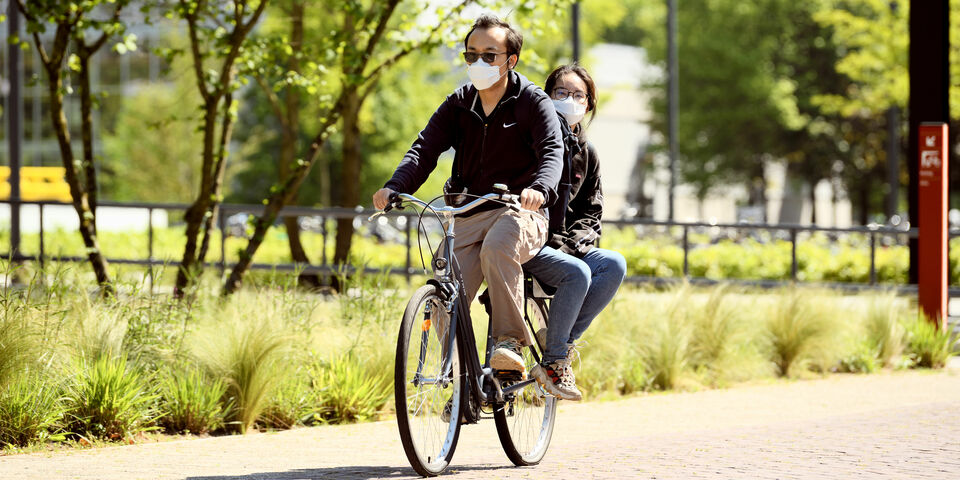Much ado about face coverings
Don't worry, everyone gets it! According to Education Minister Ingrid van Engelshoven students and employees understand perfectly well why face coverings are being not made mandatory in higher education while elsewhere they are, in further education for example. However, as of Monday October 5th, everyone at TU/e is strongly advised to wear a face covering when on the move in our buildings. A face mask was already mandatory in the elevators in Atlas and Vertigo and in certain situations in the labs.
Just in case anyone has succumbed to confusion in the face of all this, we've drawn up a list of clarifying questions. So, what's the deal with face coverings?
What is the cabinet currently advising us about face coverings?
The advice changes rather quickly, but here's where we are at now: Prime Minister Rutte advises everyone to wear a face covering in indoor public spaces. So, wear a face covering in stores, museums, local council offices, stations, airports, multistory car parks, gas stations, restaurants, cafes, theaters and concert halls, except when you are sitting down. And, further education schools are also on this list.
Not at universities and universities of applied sciences?
No, not there. They are not ‘public’ indoor spaces.
But an indoor space is an indoor space, isn't it?
Making the wearing of face coverings mandatory in higher education (and secondary vocational education) would add little. So goes the thinking, and this can be grasped by everyone, so Minister Van Engelshoven believes. Besides, in higher education, students and employees are already sticking to the 1m50 rule. That's the approach being used.
But restaurants and museums are also observing the 1m50 rule, aren't they?
Yes, this is what makes it confusing. But a key factor is that educational establishments are in charge of their timetables. They are able to control how many students and employees enter their premises fairly successfully. And, unlike in museums and restaurants, it is always the same people who enter the premises. Among students there are a good many corona infections, but students are getting infected in their private lives not, as far as is known, while attending their courses.
And are they any exceptions to this cabinet advice at TU/e?
Yes, there are. On the evening of Friday October 2nd, the TU/e Board authorized an email appeal to students and employees that they wear a face covering when on the move in all TU/e buildings. This urgent advice comes into force on Monday October 5th. According to university secretary Suzanne van Weelden, with this step the Board is paying heed to the discussion and questions circulating among TU/e employees and students. The mask may be removed upon reaching the seat where work or study will be carried out. Lecturers are entitled to ask students to keep their face covering on in rooms where education is delivered, but they cannot require students to do so. At TU/e the requirement to wear a face mask applies only in the elevators in Atlas and Vertigo where two or more people are taking the elevator together. TU/e provides no face coverings; students and employees are responsible for providing their own. In this respect, the university is acting in line with the other Eindhoven-based educational institutions Fontys and Summa.
Likewise, the University of Groningen is keen for everyone to wear face coverings in its buildings. Rotterdam University of Applied Sciences is keen to make face coverings mandatory as soon as possible. Amsterdam University of Applied Sciences, The Hague University of Applied Sciences and Inholland University of Applied Sciences have already issued the urgent advice that one be worn.
What is the difference between something being mandatory and 'urgent advice' or being 'strongly advised'?
‘Urgent advice' or being 'strongly advised' is not the same as something being 'mandatory', which means you have to do it. But perhaps it would be wise to treat 'urgent advice' as a requirement, otherwise things get awfully confusing. Think about why you are wearing a face mask: to stop the virus spreading. Not: will or won't I get fined if I don't?
Do these face coverings help?
The consensus seems to be that they help a little, but they are no silver bullet. In many other countries it is completely normal to wear a face covering, as anyone who has taken a vacation lately can attest. In the meantime, the Outbreak Management Team (OMT), a Dutch national organization, is preparing new advice on face coverings.
And if the OMT recommends face coverings?
Then everything changes. This may happen as early as this evening.


Discussion